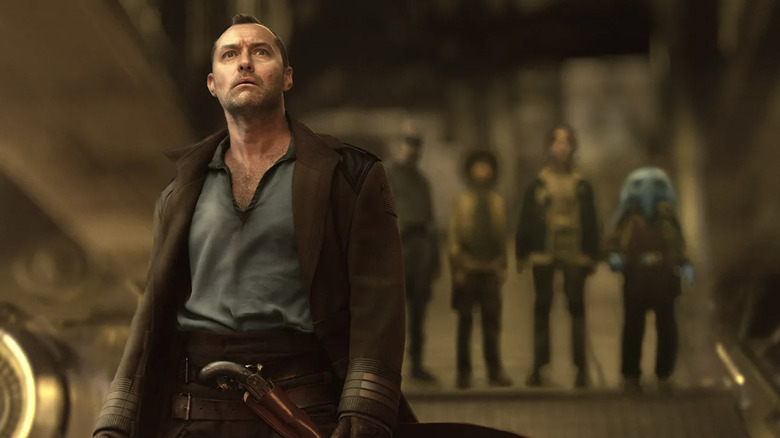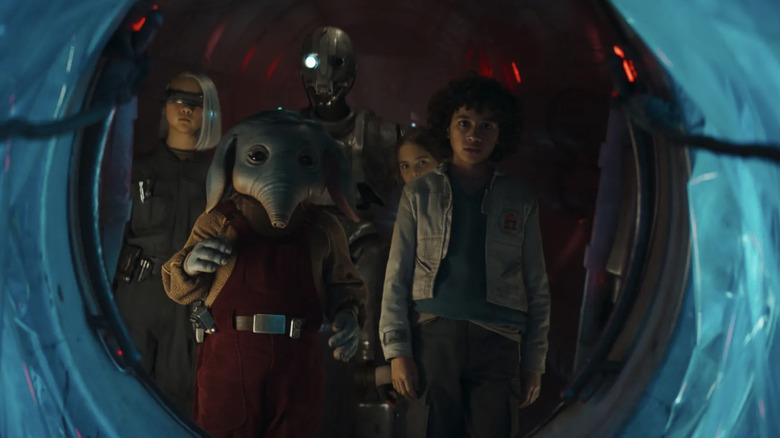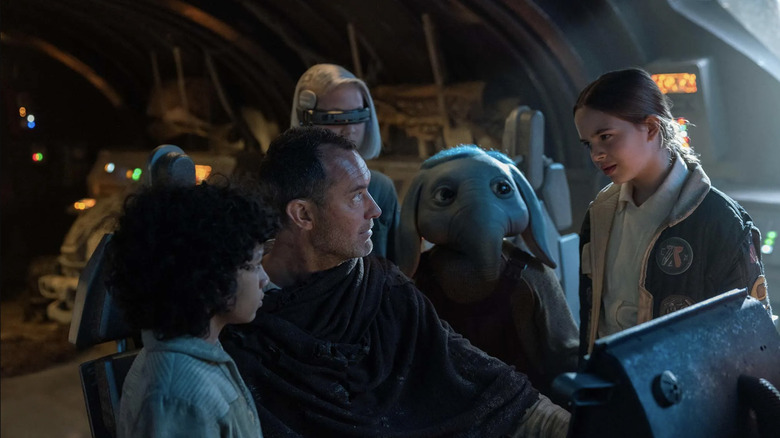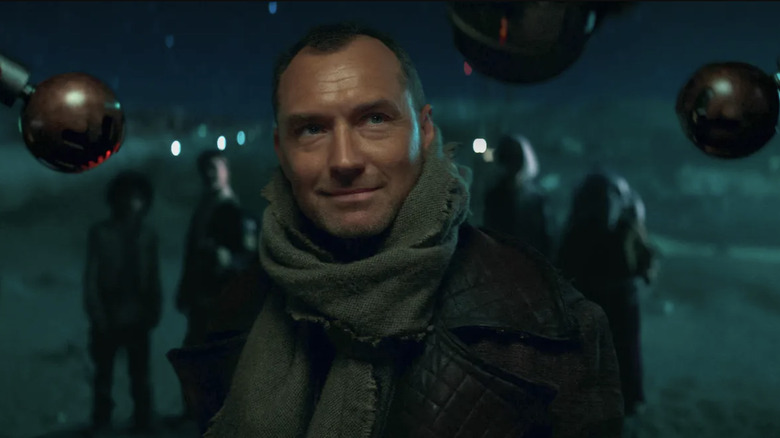Star Wars: Skeleton Crew's Jude Law Reveals What He Learned From His Young Co-Stars [Exclusive Interview]
George Lucas famously stated that "Star Wars" was always meant to be a series for kids, but it's not often that children are represented in the franchise as major players, save for Jake Lloyd as young Anakin Skywalker in "Star Wars: Episode I — The Phantom Menace," who to this day deserves an apology from every "Star Wars" fan. The latest Disney+ series set in a galaxy far, far away is here to course-correct, with Jon Watts and Christopher Ford's "Skeleton Crew" proving that there are few things in this world as magical as going on an adventure with your friends, especially when your universe includes spacecrafts, alien pirates, and Jedi. "Skeleton Crew" is easily one of the best "Star Wars" shows since the start of Disney+, and we're only a few episodes into the series.
Ahead of the release of "Skeleton Crew," I was honored with the chance to sit down with creators Jon Watts and Christopher Ford, as well as star Jude Law (and the true stars Ravi Cabot-Conyers, Ryan Kiera Armstrong, Kyriana Kratter, and Robert Timothy Smith) to learn more about bringing this series to life. For the full interviews, you'll want to tune into our "Skeleton Crew" episode of the /Film Daily podcast at the bottom of the article, but for our dedicated readers, we're including a handful of our favorite moments from these interviews to hopefully entice you into checking out the "Star Wars"-by-way-of-Amblin series.
Note: This interview has been lightly edited for clarity and brevity.
Jon Watts and Christopher Ford explain the key to making Star Wars work
Between "Skeleton Crew," Spider-Man, and "Cop Car," you both seem obsessed with kids getting into hijinks. Is this a reflection of your own histories as kids getting into hijinks, or is this a little bit of wish fulfillment because you were goody-goodies? What's going on there?
Jon Watts: No, I think what it is, is it's what I always wanted to happen as a kid. I grew up in the middle of nowhere and for fun, you just go walk in a field in a straight line and you would just hope that you would get abducted by aliens, or find a buried pirate treasure or something like that, and then that never happened. We never even found a cop car, as much as we hoped that we would. So yeah, all of these films, I think we're just trying to make that dream come true.
I interview a lot of people, and people talk about the movies that made them want to make movies and want to write movies. "Star Wars" and "Jaws" are the two that people cite the most, but "Skeleton Crew" is likely going to be an introduction to this world for an entire generation of people. Have you processed yet that your project is going to foster that love of this world that is going to make other people want to make movies?
Christopher Ford: Wow.
Watts: I think when "Star Wars" really works, no matter how old you are, it makes you feel like you're 10. So by telling the story through the eyes of four 10-year-olds, we're hoping to capture that same feeling of what "Star Wars" felt like to us when we saw it the first time.
Ford: And to what you're saying, I think it's really weird being on this side of the "Star Wars" thing as a fan for so long. And as much as we love our characters and we crafted this whole story, and put so much work into it, I still don't really feel like it's ours. It's for the fans and for everyone who appreciates "Star Wars," and so to me, it feels totally natural that a new generation or other people will have their own opinions and take things from what we've done and do something else with it. I'm so much more interested in being part of that continuing use of "Star Wars" as opposed to us saying, "This is our story, the end." I want to add into the communal thing.
Watts: It's nice to add a little bit of a postscript to the giant myth.
Ford: So much about filmmaking is so collaborative, so it's not "I think it's this," it's like, everyone comes together and works on it together.
Jude Law shares what he learned from the young cast
You are working with children — like, a big crew of children. And you've been performing for pretty much your entire life. So what is it that you think you were able to learn from working with the children? Because I'm sure they're going to be asked all day, "What did you learn from Jude Law?"
Jude Law: [laughs] "What did you learn from Jude?"
Yeah. So what did you learn from them?
Law: [joking] Not much, kids! No. [laughs] What did I learn from them? It's a lovely question. First of all, I was so impressed very, very quickly at how adept they were. Sometimes you work with kids and they've clearly been cast just because they're like the part, and then it's complicated because then you're really trying to just capture them doing what they do on camera.
These were actors. These kids, they knew what to do. They were prepared. They really leaned into the emotions and wanted to get it right. I mean, they were professional actors. They were also kids, so there was this sense of play. And I think that's the key: They were a reminder that it is a playful environment. Even when you're doing drama, you're there, it's a magical environment. You're creating something, you're suspending belief.
Obviously, in an environment like this, it's easier to do that, because you've got creatures and spaceships and blasters and what have you. But even in a more modest and humble kind of environment, you're still creating drama. So I think their sense of play and wonder was really infectious, and a good reminder of how you can approach the work.
Jude Law teases a reveal about Jod Na Nawood
I love hearing that so much. Because especially in something like "Star Wars," which is so lore-heavy, there are always people who will watch this and go, "Well, that wasn't correct for this thing from whatever, whatever."
Law: Yes. That's right.
I think sometimes people get hung up on that and they forget that it is still fun. It is still a playful environment to be in.
Law: That's right.
I would love it if you could share any of your preparation for entering such a lore-heavy world that is so beloved by so many people, which obviously you've done before with other franchises. But "Star Wars" is kind of its own beast — there really is nothing like it. So how do you prepare to enter this galaxy far, far away?
Law: I had a lot of faith, when it was pitched to me, in Jon and Chris. They had done such hard work, and I loved the concept of seeing it all through these young protagonists. And they also obviously knew the galaxy very, very well, or the canon. And we had the godfathers of Favreau and Filoni looking out for us, who were there to sort of fill any holes or gaps that may appear. I felt confident that I knew it pretty well. To me, more than anything, it was about getting the tone of the performance right. I'm someone who always enjoyed the kind of cynical humor of the films and contrasting that with the sort of jeopardy and the drama. I feel like that's the sweet spot of "Star Wars" for me and my memory of watching the first three, certainly, as a kid.
So to me, it was more a case of really trying to weave all of that into the performance, into Jod. It wasn't a case of trying to make sure — it wasn't my job, really, to make sure the details were correct. But then again, when we were discussing the past and his childhood, Jod's childhood, I checked all of that in with Jon and Chris. And I think in the end we use some of it in later episodes when we find out where he's from.
Mm-hmm. Interesting.
Law: If you find out where he's from.
Oh?
Law: Did I just give something away? No, I didn't. [laughs]
"Skeleton Crew" is now streaming on Disney+ with new episodes every Tuesday.



